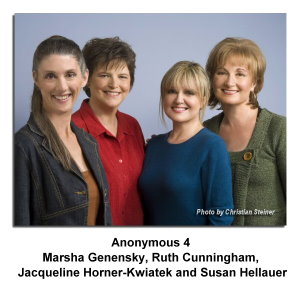
ReviewsAnonymous 4 On the balmy night of March 5, the line to hear the Anonymous Four at Bruton Parish Church in Williamsburg stretched out the door, through the churchyard, around the corner and down most of the block. Even with folding chairs in the narrow aisles, it was standing room only for the a cappella group’s Sisters in Spirit program, which explored the “secret voices” of fourteenth-century religious music from the Spanish Cistercian convent of Las Huelgas and, in the second half, sacred music in the American tradition.
Because of the crowd and the high walls of the raised pew enclosures, no one sitting more than two rows back could see the singers — Ruth Cunningham, Marsha Gerensky, Susan Hellauer and Jacqueline Horner-Kwitak — but their extraordinarily precise diction and immaculate blend could be heard and understood clearly. They began with the lilting rhythms and long sections of wordless pure melody in Virgines egregie and Ave Maris Stella. The Kyrie Rex virginum amator contrasted chant with filigreed ornamentation, coming to beautiful unisons and octaves floating in the air. In Spiritus et Almis, the traditional Gloria was ornamented a bit and interleaved with tropes of Marian praises; a simple, elegant Sanctus and Benedictus closed out the main sections from the Mass. The hybrid conductus-motet O Maria virgo/O maria maris stella (IN VERITATE) had a single voice in high melody against wordless voices underneath, before all four voices joined together in independent lines. The triple-rhythm sequence In virgulto gracie brought out the beauty and simplicity of the Latin poetry. O monialis conscio, a lament sung when a member of the order had died, was a plaintive, soaring melody. The voices danced in the thirteenth century round, Benedicamus domino à 3. Si vocatus ad nupcias returned to the theme of the wise and foolish virgins from the opening sequence; the Anonymous Four reminded listeners how stunning unisons could be. The dancing rhythms of the Marian song Mater patris et filia, the brief Benedicamus domino à 2, with its final gratias spun out like finest silk, and the hymn Omnium in te finished the first half of the program. To span the centuries from Latin chant with distinctive Spanish diction to the radically different style of more familiar American spiritual songs takes not only beautiful voices but, as importantly, respectful attention to the particular genre. The Gloryland selections, in less skilled hands, could turn mawkish. The difference was apparent from the beginning of the inviting revival song I’m on my journey home/O who will come and go with me. Amazing Grace was not sung on the familiar NEW BRITAIN tune but on the hymn tune JEWETT, whose bouncy melody and rousing “Shout for glory” chorus almost reminded one of the tune from Gilligan’s Island. (Yes, you can sing Amazing Grace to the theme from Gilligan’s Island, but it’s not advisable in church.) The gospel song Sweet Hour of Prayer was simply beautiful; if one had heard it sung only with throbbing vibrato, this was a revelation. Open fifths and fourths underscored the plaintive yet confident version of Wayfaring Stranger, followed by a stunning rendition of Gently, Lord, O gently lead us on the PLEADING SAVIOR tune. The hopeful sadness of the text, “in the hour of pain and anguish, when death draws near, we await among the blest,” was sung pianissimo; no one in the audience wanted to breathe until it was truly over. In contrast, the revival song Savior, visit thy plantation on MERRICK claimed reliance on the Lord with an almost chirpy refrain. The fuguing tune BLOOMING VALE (O were I like a feathered dove) explored the ranges of all the voices without a word being lost. (Awesome; simply awesome.) The familiar gospel song Shall We Gather at the River appeared in a lovely arrangement, with “soon we’ll reach the silver river” in the group’s gorgeous pianissimo. A tiny, sharp yip gave a juicy tang to the parting song Farewell, my friends, and the final song, Angel Band, brought a gospel swing to its visionary lyrics. There were some knowledgeable chuckles during the very brief, witty encore; those familiar with the dismissal rite of the Roman Mass knew that Ite Missa est meant “Go, the Mass is ended.” And so was the concert, which was a joint presentation by Colonial Williamsburg and the Virginia Arts Festival. As part of the VAF’s educational outreach, three of the Anonymous Four (one was ill) gave a master class for the madrigal singers of Walsingham Academy in Williamsburg the previous afternoon. Printer Friendly Format |
 The convent of Las Huelgas was founded in the twelfth century by King Alfonso VIII of Castile as a refuge for royal and noble women seeking the religious life; although it became a house of the Cistercian order, the aristocratic women had a high degree of independence, singing liturgical music restricted elsewhere to men. Anonymous Four — the name is taken from the most important of several treatises on early music — presented fourteen selections from the Codex Las Huelgas, an anthology of polyphonic and monophonic Latin song from various sources.
The convent of Las Huelgas was founded in the twelfth century by King Alfonso VIII of Castile as a refuge for royal and noble women seeking the religious life; although it became a house of the Cistercian order, the aristocratic women had a high degree of independence, singing liturgical music restricted elsewhere to men. Anonymous Four — the name is taken from the most important of several treatises on early music — presented fourteen selections from the Codex Las Huelgas, an anthology of polyphonic and monophonic Latin song from various sources.